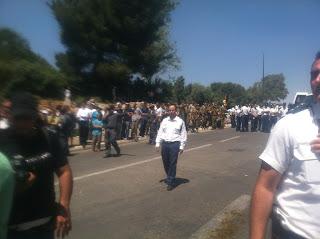With regards to the ongoing peace process between the nation-state of Israel and the nation of the Palestinians, currently regarded as being more or less stalled, many theorists would maintain that it is a matter of people and ideologies more than a matter of geopolitics. After all, the most contentious geopolitical factor in this process, the one that has contributed to a stalemate in talks more than any other, is control of East Jerusalem. Seeing this "East Jerusalem" for the first time really shocked me. I find it downright absurd how people are willing to stay stubborn and in some cases die for such a meager collection of arid hilltops. In this way, the agency viewpoint begins to show its merits--why would a discussion over such geopolitically irrelevant land continue as it has if not for the ideological and personal traits of the competing parties. Also, in explaining why the peace process has more or less stalled, one can clearly correlate the pro-peace government coalitions of Labor leaders Rabin, Barak, and Olmert with more success in peace talks between Israel and the Palestinians than the governments of Likud leaders Begin, Shamir, and Netanyahu. The process has stalled under Netanyahu because he is anti-peace...right?
MK Einat Wilf had a very convincing structural argument explaining the stalled status of the peace process. By her logic, the 1990's were the most ideal time for peace between Israel and its neighbors, including the Palestinians. The Arab countries surrounding Israel had lost their support from the Soviet Union--it seemed that there was either the US's way or the "highway." The peace process has made most progress immediately following the two Intifadas. Now that there is a relative peace between Israel and the Palestinians, and the US's interests are served more by the status quo than by disrupting a stable relationship with Israel during a time of uncertainty in the region, why would Israeli and US leaders commit to a painful reopening of the peace process?
I believe that in discussing this topic, both sides must be considered. The structural factors must be in place, and the right leaders need to have the will and desire to act upon them.





